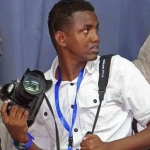'Couldn't believe my eyes'
Mogadishu -- I have covered bombings and attacks in Mogadishu for years, but this one was completely different. You probably think that after years of photographing death and destruction, the attacks would stop affecting me. But it’s not true. When I got to where it happened, I couldn’t believe my eyes.
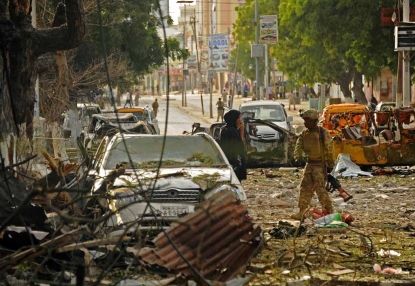 (AFP / Mohamed Abdiwahab)
(AFP / Mohamed Abdiwahab)I was playing football when the car bomb went off. It wasn’t far from where I was. I heard a boom and I saw smoke rising into the air. So I did what I usually do. I ran for my camera. I usually always have my camera with me, but when I play football, I leave it in a house a block away. Otherwise, it can get stolen. But it’s just a block away, two minutes. So I ran to grab it and then I ran to the scene.
When I got there, I couldn’t believe my eyes. You see, the area where it happened, outside the Ambassador Hotel, is an area of the city that I consider my own. I come and drink tea with friends here almost every day. I know people around there. The guy who works in the tea shop. I was drinking tea there that morning.
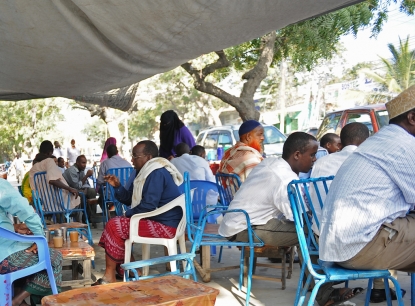 ((AFP / Mohamed Abdiwahab))
((AFP / Mohamed Abdiwahab))And when I got there, I just couldn’t believe it. It was a completely different place, like a place that I didn’t even know at all. It looked like a scene out of a movie. And that’s what got to me. This was my place, the place where I hung out. The first two bodies I saw, they were people I saw that morning. One of them was an old man. He was just lying on the road. ‘This is not the place where you sat this morning,’ I told myself as I looked around. It felt like that attack had hit me. The people who were hurt, it was like I was part of them.
When I first got there, everybody was screaming. Everyone was running for cover and screaming, not helping anyone, it was chaos. People were confused, everybody wanted to take cover because of the bullets.
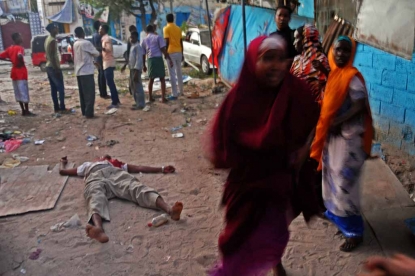 (AFP / Mohamed Abdiwahab)
(AFP / Mohamed Abdiwahab)I was thinking about how this was my place and I no longer recognized it. I was thinking about my friends, the people I knew who were killed by the attack. I was thinking about my own safety. And I was thinking that I had to get to work. I had to start working.
I looked around and saw a white car nearby. My cover. You don’t want to be out there exposed after an attack like this, you’re a sitting duck.
So I went behind the car and started taking pictures. And then I heard this moaning. ‘Oohhh, oohhh. Is anyone there? Help, Help.’ It was a guy, he was under the car, it was on top of his legs so he was trapped.
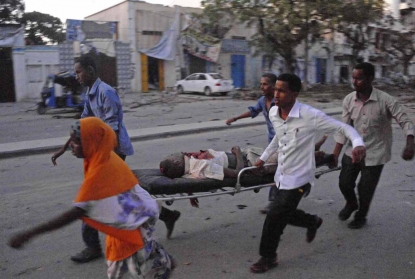 (AFP / Mohamed Abdiwahab)
(AFP / Mohamed Abdiwahab)In situations like this there is a time to take pictures and there is a time to help, to show your humanity. But I can’t lift a car by myself. Two other people ran over. We tried to lift it, but we couldn’t. So we waited for others to come. While we waited, I took some more pictures. Then other people came, two soldiers. We finally managed to lift the car and pull him out. But his legs were completely destroyed. It was a terrible scene. “How am I going to walk again?!” he screamed. “How am I going to provide for my family? Now I’m a cripple!” It was terrible, just terrible.
I’ve covered so many attacks like this, I’ve seen so many people dying, I can’t even count. Death is a daily part of life here. You wake up every day knowing that you, or a friend or a member of your family may not live to see the end of the day. But scenes like that, they still get to me.
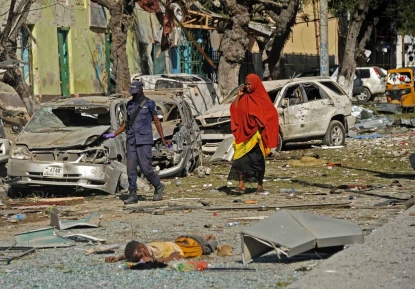 People walk by a victim of the attack. (AFP / Mohamed Abdiwahab)
People walk by a victim of the attack. (AFP / Mohamed Abdiwahab)There are times when I can’t sleep at night. The attacks just come back into my head. You relive each attack a few times. The first when you’re actually there. The second when I edit my pictures and send them in. I see it all over again. And then there are the flashbacks. They pop into my head. Usually at night, in my dreams. Often I just wake up at night with a jolt, because I’m reliving it all over again.
Why keep doing it? Journalism is my passion and has been ever since I can remember. And I tell myself, at least you’re doing something to let the world know about this. All these people getting killed, getting maimed year in and year out. They’re innocent and noone knows about them. But at least I’m letting the world know -- they were here, this is what happened to them. So that’s what I keep telling myself. At least you’re doing something good.
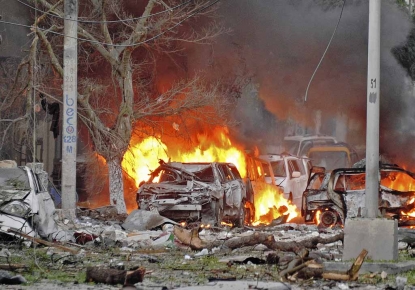 (AFP / Mohamed Abdiwahab)
(AFP / Mohamed Abdiwahab)I pray a lot. I ask God to spare me. “God, this is me, your servant,” I say. “If I die my family is going to be out there without anyone. Please keep me alive.”
I’m lucky in that I’ve never been seriously injured. Just some shrapnel wounds, thank God. Sometimes when you’re taking these pictures, you’re out on the street and the shooter is on top of a building. He can see you, you can’t see him. You’re not hiding, sometimes you don’t take cover. Sometimes I’m in a situation and I tell myself ‘You’re already dead, you’re already dead, you may as well go.’ And then I go.
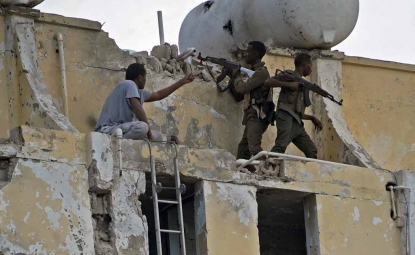 (AFP / Mohamed Abdiwahab)
(AFP / Mohamed Abdiwahab)I don’t show the pictures I take to my family. Certainly not to my Mom and Dad, and not even my brothers. If they saw the pictures, they’d start to worry. If I showed them my pictures, I’m not sure that my Mom would let me go out anymore… During the night of this attack, my Mom must have called me 10 times. I kept telling her, I’m not close to the place, don’t worry. And she kept saying, “Please, don’t go close to there, please don’t go close to there.” It’s like that every time.
I’m 29, I'm married, I have four kids, the oldest is about to turn seven, the youngest is a month and a half. We have lots of kids here. That’s all we got. My wife knows better than my Dad and my Mom about what I do because she went to school and she understands journalism. She keeps pushing me hard not to go to these places and take the pictures. “What about if you die,” she says. “What about us? Who is going to help us.” This worries me. I have kids, so I have to stay alive, I am the breadwinner for my family. Everyone wants to stay alive...
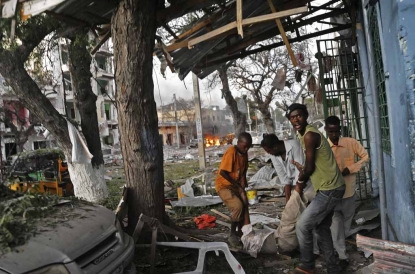 (AFP / Mohamed Abdiwahab)
(AFP / Mohamed Abdiwahab)I’ve had plenty of opportunities to leave. Many of my colleagues are in the West, they all tell me to flee. But for me, I never get the feeling of wanting to leave the country. Does that sound crazy to you? This is my home and I am doing what I love. If I go to Europe or the West, what will I do? Journalism here is different.
I like my country, I like what I am doing. I’m fine here, I’m fine with my life. I don’t want to be a refugee. It’s difficult to be a refugee.
But my kids? Sometimes I want them to leave. I see that this country is not getting out of anarchy. I think of their education. Will they get a proper education here? No. So I would like them to go and get a proper education. So in that regard, if I have an opportunity, I would like to help my family leave the country. But even so, on the other hand, I want them here with me. I love them. I want to see my kids, I want them with me, I don’t want to be alone here, I don’t want to just see them by Skype. But if I get an opportunity, I would get them out. Make the sacrifice for their education.
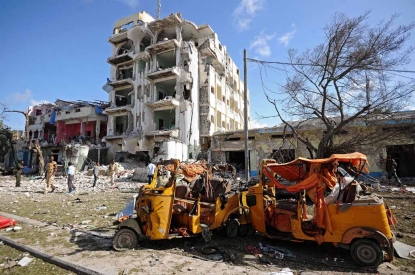 (AFP / Mohamed Abdiwahab)
(AFP / Mohamed Abdiwahab)Whenever there is an attack, there are several things that I do. I grab my camera. I call colleagues and ask where they are. You don’t want to be the first one on the scene with a camera. The security forces, they’re very tough. When they get to the scene and they see you there with a camera, they can think that you had information about the attack beforehand. They can kill you. When they first come to the scene, they don’t discriminate of who is there and who is not there. They come, they start shooting, so sometimes you can easily lose your life.
So you think camera, you think safety, you call other journalists nearby. Those are the techniques. And I always call my wife when I get to a place, so she knows where I am. I don’t have to call my Mom because she’ll end up calling me within minutes anyway.
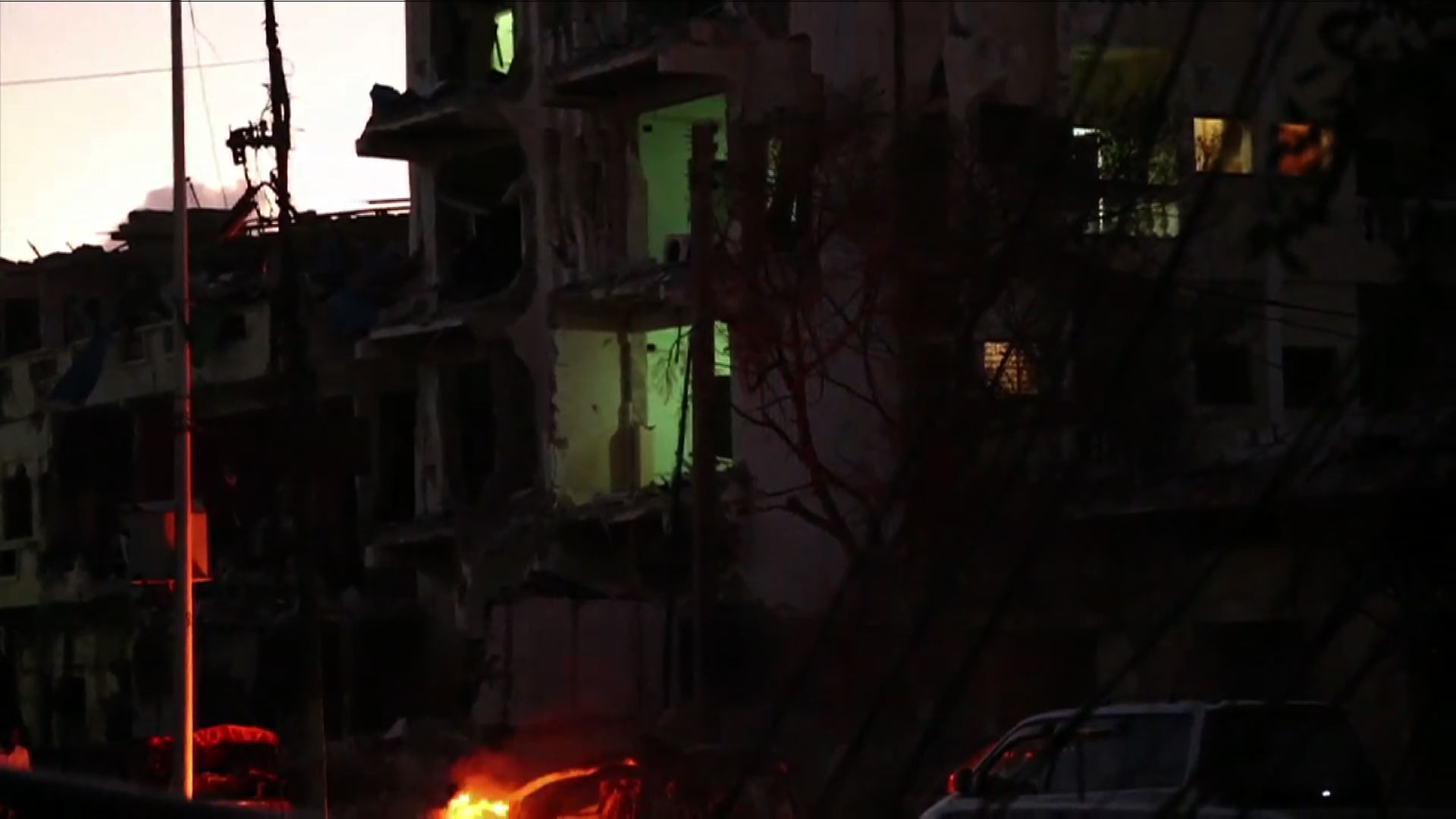
You also have to be aware of the people around you during the attack. People get crazy. If they see you just taking pictures, people start shouting at you that you are not human, they can get really aggressive. When people need my help, I help. You can’t continue to take pictures when people are screaming and are in need. Like the guy under the car. When they need my help less, or there are others to help, I keep taking pictures.
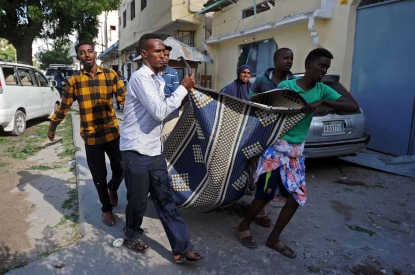 People carry a victim of the attack. (AFP / Mohamed Abdiwahab)
People carry a victim of the attack. (AFP / Mohamed Abdiwahab)Many of my colleagues have died. Last November, I was with a friend of mine at an attack and we both took cover at different cars and he was just blown to bits. There are too many guys who have died. Others have left. There are still some who are alive.
We talk about who is next. It can happen to you. Anytime. Anyplace. It can be an explosion, or crossfire, or an accident. Anything. We are ready. Most people in Mogadishu are like that. If it doesn’t happen to you, it’ll happen to your brother, your neighbor, your sister.
We joke about it. After an attack, when we drink tea, or are on Facebook, we ask each other about it. How was it out there today? And we know that someday it’s going to be our day. Our turn to die.
This blog was written with Yana Dlugy in Paris.
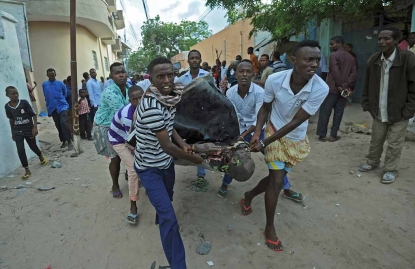 (AFP / Mohamed Abdiwahab)
(AFP / Mohamed Abdiwahab)


